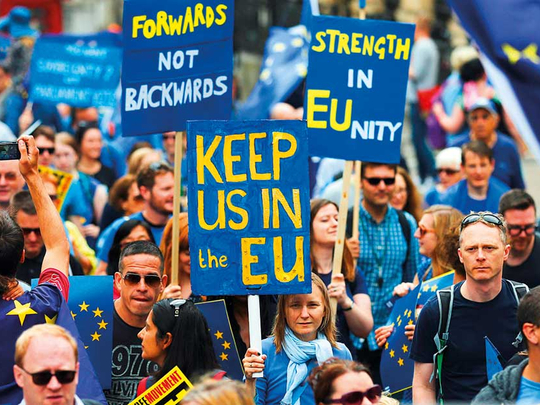
MADRID: With the clock now very much counting down to the United Kingdom’s exit from the European Union one year from now, much of the focus on the effects of the divorce has focused on just how the UK will fare in a post-Brexit world.
But a new study shows that the decision by 17.4 million Britons who voted to leave the EU will also have an extensive — and expensive — knock-on effect across the continent.
Germany, Europe’s largest economy and the world’s fourth-largest last year, estimates that its businesses could be sideswiped by losses of as much as €9 billion (Dh40.4 billion) annually if Britain crashes out of the EU a year from now with no final deal in place.
Any final deal on the UK’s divorce terms has to be ratified by all other 27 members, the European parliament and by the European Commission — meaning that there are a little more than six months left for that to happen.
If the UK doesn’t reach a deal — the so-called “hard Brexit” occurs. That means the UK would revert to trade rules overseen by the World Trade Organisation. For German businesses who do business with their UK counterparts, that would be the worse-case scenario.
WTO rules would mean tariffs and regulatory barriers including licensing procedures and potentially lengthy waits at borders, which also result in costs for businesses, a report by management consultants Oliver Wyman and multinational law firm Clifford Chance says.
And they say German auto manufacturers would be hardest hit, with the sector accounting for one-third of that €9-billion hit every year.
No deal, the report warns, would mean Britons would face a €32 billion shortfall. And across the EU27, the cost would be €39 billion, with the shock waves hitting the Republic of Ireland, the Netherlands, France, Belgium and Germany — with ripples across the entire economic and political bloc.
And even though negotiators from Brussels and the UK are trying to hammer out a deal, progress has been slow. That snail’s pace led Oliver Wyman Germany’s head Finja Carolin Kuetz to warn small companies could be especially hit by the new complexity of relations, she said.
“Over 60 per cent of exporting small and micro enterprises in Germany only trade within the EU and have no processes for trading outside Europe,” Kuetz said.












